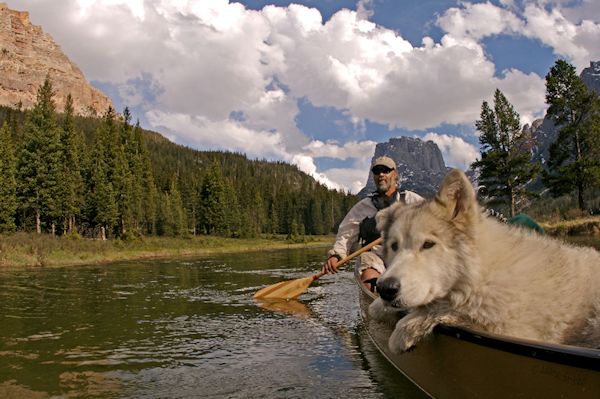SEJournal Online is the digital news magazine of the Society of Environmental Journalists. Learn more about SEJournal Online, including submission, subscription and advertising information.
 |
| Award-winning journalist Angus Thuermer in the Bridger Wilderness in Wyoming's Wind River Range. Thuermer is the one paddling in the back of the canoe behind Heeshma. Photo: Leine Stikkel. Click to enlarge. |
Inside Story: How Explanatory Reporting Can Define a Challenged Landscape
Angus M. Thuermer Jr.’s coverage of water law, gas wells, unlined pits and chronic wasting disease for WyoFile.com earned him an honorable mention for outstanding beat reporting (small market) in the Society of Environmental Journalists’ 2019 Annual Awards for Reporting on the Environment. Judges said that Thuermer “covers the territory in Wyoming with insightful and well-documented reporting on a range of significant local and regional environmental issues.” Thuermer, who lives in Jackson Hole, Wyo., previously worked as the editor at Jackson Hole News & Guide. SEJournal Online recently caught up with him. Here is the conversation.
SEJournal: How did you get your winning story ideas?
Angus M. Thuermer Jr.: Several stories on different topics made up the entry and they were prompted by an anonymous tip (water law), an activists' forum (groundwater pollution), field knowledge and document tracking (sage grouse), a news release (chronic wasting disease) and an editor's suggestion (public lands).
SEJournal: What was the biggest challenge in reporting the pieces and how did you solve that challenge?
Thuermer: Understanding the science, nuances and rules regarding water law, underground oilfield pollution, sage grouse biology, wildlife disease transmission and public involvement in governmental decisions. Solving the challenge involved a lot of research, reading and interviewing.
SEJournal: What most surprised you about your reporting/findings?
Thuermer: Most of them could be boiled down to concepts that an eighth-grader could understand, yet in general few, or a minority of, people knew about these issues.
SEJournal: How did you decide to tell the stories and why?
Thuermer: In each instance, an event sparked questions regarding a topic I had reported on before and called for an explanation that often relied on an understanding of the issue, coupled with new research and reporting.
‘Issues that seem complex need to be studied
by reporters who can then break them down
and help explain them to the public.’
— Angus Thuermer
SEJournal: What would you do differently now, if anything, in reporting or telling the stories and why?
Thuermer: Not sure. It seems you can never talk to/interview too many people.
SEJournal: What lessons have you learned from your stories?
Thuermer: Listen closely. Don't dismiss ideas and/or tips readily. Ask more questions. Issues that seem complex need to be studied by reporters who can then break them down and help explain them to the public.
SEJournal: What practical advice would you give to other reporters pursuing similar pieces, including any specific techniques or tools you used and could tell us more about?
Thuermer: There is no substitute for being in the field. This may be an essential foundation for understanding a topic. Interviewing and research can build on this.
SEJournal: Is there anything else you would like to share about these stories or environmental journalism that wasn’t captured above?
Thuermer: The reporter has to be able to thoroughly explain every aspect of his/her reporting and generally understand much more about a topic than what appears in a story. When an editor gets my copy she is going to quiz me about many aspects, including whether I have sought comments/views from all parties. I have to be ready and capable of answering all of her questions. Editor feedback is highly valuable and there's no substitute for that critical eye. The story will be inspected/dissected sooner or later, so it's best that such a critique happens upfront.
Angus M. Thuermer Jr. has worked as a reporter, photographer and editor in Jackson Hole, Wyo., for the last 40 years. Most of that time he spent with the Jackson Hole News, part of it with the Jackson Hole News & Guide. He now works as a natural resource and general assignment reporter for WyoFile, a digital nonprofit news organization covering the “Equality State.”
* From the weekly news magazine SEJournal Online, Vol. 5, No. 22. Content from each new issue of SEJournal Online is available to the public via the SEJournal Online main page. Subscribe to the e-newsletter here. And see past issues of the SEJournal archived here.














 Advertisement
Advertisement 



